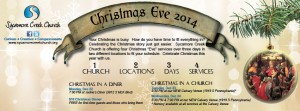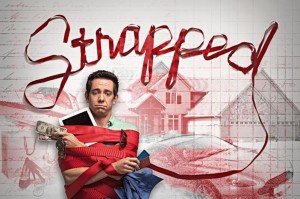The Christian Wallet: Why Do We Give? *
Sycamore Creek Church
January 17/18, 2016
Tom Arthur
Peace friends! And happy New Year.
What are the life skills you’re training in your children or grandchildren? There are certain spiritual practices we’re training our own children in. We do Bible reading and prayer each night before bed. We serve together as a family. We came to the S Penn Venue together in December to clean the building. We’re training our children to worship weekly, even when we go on vacation. We went with Sarah’s parents to their church when we were away after Christmas. We are training our children in confession and forgiveness. When one does wrong to someone, we ask him to ask the one he wronged to forgive him. When I do something wrong to one of my boys, I confess the wrong and ask for forgiveness. We also are beginning to train our oldest boy about money. He has three jars on the kitchen counter: Give, Save, and Spend. He gets three quarters each week and one quarter goes in each jar. He brings the money in the give jar into the church to put in the offering. We are training our children to give their money away. But why? That’s the question I want to deal with today. Why do we give? I want to give you three reasons why you’d give your money back to God through the church.
- To keep close to the heart of God
When you give your money to the church you keep your heart, the deep place in yourself, close to God. Jesus teaches:
For where your treasure is, there your heart will be also.
~Matthew 6:21 NRSV
Make sure you notice the direction here. Your heart follows your money. Not the other way around. The decisions you make about how you spend your money shape the form of your heart.
Last year Sarah and I sold our house in Petoskey. We had owned that house for about fifteen years. We put a lot of time and money into that house. When we sold it I was curious how much money we had dumped into the house. So I figured an average amount for our mortgage payment, taxes, utilities, and repairs and added it all up. The total amount we spent on that house came to about $170,000 over fifteen years! $170,000! $170,000 is enough to anchor your heart anywhere. And while we had the house, our hearts were in Petoskey. But when we sold the house it freed up our hearts to really reside and root in Lansing.
Forbes provides a list of the top five things you’ll spend your money on over your lifetime. These five things will require about half of all the money you make:
- House (30%)
- Car/Travel (10%)
- Kids ($225,000),
- College (10%)
- Retirement (10-15% = Salary x 25)
Based on this list, our hearts will be in our homes, our cars, our kids, our education, and our retirement. That pretty well sums up what most of us spend our lives pursuing. But what really struck me about this list was that God didn’t even make a showing. Is God in your top five?
You give generously to the church to keep your heart close to God!
Paul, the first missionary of the church said:
The fruit of the Spirit is love, joy, peace, patience, kindness, generosity, faithfulness, gentleness, and self-control.
~Galatians 5:22:23 NRSV
Many of you know that verse not with “generosity” in it but “goodness.” The Greek work implies goodness through being generous to those around you. When God’s Spirit is at work in you, generosity becomes a mark of your character. You do good generously, including with your money.
So is God not interested in my house, car, kids, education, and retirement? Not exactly. God’s vision for the world is a world of “Shalom.” Shalom is Hebrew for “peace”, but shalom is much more than the absence of war. Shalom is peace, well-being, and prosperity all around for everyone. Shalom includes justice to those who are without justice. There is no peace without justice. There is no shalom without justice.
Shalom pops up in one of the most famous blessings in the Old Testament, the Aaronic Blessing. Aaron was Moses brother and the first priest of the tabernacle. This blessing of his is recorded in the book of Numbers:
The Lord bless you and keep you;
the Lord make his face to shine upon you, and be gracious to you;
the Lord lift up his countenance upon you, and give you peace [shalom].
~Numbers 6:24-26 NRSV
God is definitely interested in shalom, well-being, peace, prosperity for all of God’s creation, but God’s primary mission is not to make you safe, comfortable, and entertained. God’s primary mission in Jesus is elsewhere…
- To meet the needs of the poor and poor in spirit
Our world is broken and doesn’t have shalom, so Jesus came into the world to seek out especially those who are lacking peace. Jesus describes his own mission saying:
The Son of Man came to seek and save those who are lost.
~Luke 19:10 NLT
Your heart is with God when you invest in Jesus’ mission to seek and save those who are lost!
You give generously to the church to seek and save the lost!
Who are the lost? The lost are not always just the poor. In fact, when you read this verse in its context you find that it’s actually talking about the rich. The rich are lost!
Jesus entered Jericho and made his way through the town. There was a man there named Zacchaeus. He was the chief tax collector in the region, and he had become very rich. He tried to get a look at Jesus, but he was too short to see over the crowd. So he ran ahead and climbed a sycamore-fig tree beside the road, for Jesus was going to pass that way.
When Jesus came by, he looked up at Zacchaeus and called him by name. “Zacchaeus!” he said. “Quick, come down! I must be a guest in your home today.”
Zacchaeus quickly climbed down and took Jesus to his house in great excitement and joy. But the people were displeased. “He has gone to be the guest of a notorious sinner,” they grumbled.
Meanwhile, Zacchaeus stood before the Lord and said, “I will give half my wealth to the poor, Lord, and if I have cheated people on their taxes, I will give them back four times as much!”
Jesus responded, “Salvation has come to this home today, for this man has shown himself to be a true son of Abraham. For the Son of Man came to seek and save those who are lost.”
~Luke 19:1-10
So what’s going on here? First, Zacchaeus is “very rich.” He was very rich because he was good at extorting money out of the poor in the form of taxes. He was so good at it that he was notorious, and the people couldn’t believe that Jesus would spend any time with such a notorious enemy of the poor. But Jesus had a different mission. His mission was to seek out people who were lost, whether rich or poor. And Zacchaeus was lost in his riches. But when he encounters Jesus his life is transformed and he begins to put his money in Jesus’ mission. He reconciles his past wrongs and gives away half of his wealth to the poor. Jesus’ purpose is not so much to get us into “heaven” but to get “heaven” into us.
Heaven in us is God’s mission in Jesus in our hearts. We give generously to get God’s mission in our hearts.
The lost are the spiritual and economically lost. Matthew records Jesus saying:
Blessed are the “poor in spirit.”
~Matthew 5:3 NRSV
Luke records Jesus saying:
Blessed are the “poor.”
~Luke 6:20 NRSV
Sycamore Creek Church has a vision for seven satellites in seven venues on seven days of the week. It’s our 7-7-7 Vision. Jackpot! We’re planning on launching a new venue in 2016. A “satellite” campus is a mission to seek out the lost. We’re not content to wait for the lost to come to us. In fact, the lost can’t find us. If you’re lost, you can’t find your way. That’s what it means to be lost. If you’re going to find the lost you have to send out a search party. We’re going to go out and seek the lost with each new venue we launch. Blessed are the poor in spirit.
You give generously to the church because the church is the primary community that is all about Jesus’ mission!
Blessed are the poor.
You give generously to sustain a community that meets the needs economic needs of the poor in its community
John the Baptist, Jesus’ cousin, preached and prepared the way for Jesus. He taught:
Prove by the way you live that you have repented of your sins and turned to God…
The crowds asked, “What should we do?”
John replied, “If you have two shirts, give one to the poor. If you have food, share it with those who are hungry.”
~Luke 3:8, 10-11
This theme of providing for the poor runs throughout all of scripture. We read in Leviticus:
When you harvest the crops of your land, do not harvest the grain along the edges of your fields, and do not pick up what the harvesters drop. Leave it for the poor and the foreigners living among you. I am the Lord your God.
~Leviticus 23:22 NLT
God was setting up a system by which the poor would be provided for. No one would be left out of shalom. God was showing compassion. The Hebrew word for “compassion” is very closely related to the Hebrew word for “womb” such that God’s compassion could be considered God’s “womb love.” God has love for all of us in the way that a mother has love for her children. And more…
Can a woman forget her nursing child,
or show no compassion for the child of her womb?
Even these may forget,
yet I will not forget you.
~Isaiah 49:15 NRSV
What does a mother want for her child? I asked my mother friends on Facebook what they wanted for their children. I think the answers sum up what shalom looks like:
- Reliable home
- Healthy food
- Decent clothing
- Thriving education
- Safe place to grow up
- Good friends
- Love for God
How can a follower of Jesus provide reliable houses, healthy food, decent clothing, a thriving education, a safe place to grow up, good friends, and love for God to all those who are poor and poor in spirit? The answer is that a follower of Jesus can’t provide these things…alone. But we can do it together.
- To focus and multiply your impact
We give generously to the church to focus and multiply our impact!
We do things together that we can’t do alone. Jesus takes what we have and multiplies it. There’s this moment in Jesus’ ministry when he’s been teaching a huge crowd out in the countryside, and the disciples begin to wonder how all these people are going to be fed.
That evening the disciples came to him and said, “This is a remote place, and it’s already getting late. Send the crowds away so they can go to the villages and buy food for themselves.”
But Jesus said, “That isn’t necessary—you feed them.”
“But we have only five loaves of bread and two fish!” they answered.
“Bring them here,” he said.
~Matthew 14:15-18 NLT
Jesus takes those five loaves and two fish and multiplies them to feed thousands of people. Jesus takes what we have and makes it more. Jesus multiplies our impact. We saw this happen at Christmas this year. I put the challenge before you, as I do every Christmas, to give away as much as you spend on yourselves. I thought I was stretching you to set a goal of $12,000. Our previous record was $11,225 in 2013. You responded to Jesus’ birthday at Christmas by giving $16,075.43! Over $16,000! Wow. Do any of you have a spare $16,000 laying around to meet local and world needs? Some of you may, but most of you don’t. But together, $50 here, $100 there, we’ll give away over $16,000!
You give generously to SCC because we’re a community that
- For fifteen years has been helping provide physical “shalom” in Nicaragua by sending medical teams twice a year to provide medical clinics;
- Fixed up a house in the Baker Donora Neighborhood adding shalom to our neighborhood;
- Helps pay for rent, utilities, food, gas, etc.;
- Regularly gives thousands and thousands of items to Compassion Closet personal needs bank;
- Paints the local school to help provide a beautiful place to learn for our children in Lansing;
- Provides mental health for our community through a Christian counselor working out of our building and funds for those who don’t have insurance or can’t afford her;
- Provides a place to build spiritual friendships in a newly remodeled Connection Café;
- Partners with each family to nurture love for God in our children through Sycamore Creek Kids and Teen Fuel.
When you give generously to the church, you’re focusing and multiplying your giving!
So what’s your plan to give generously in 2016? I want to suggest four steps for beginning to put your heart where God’s heart is:
- Give for the first time
Some of you are ready to give for the first time today. That’s the first step. In 2015 we had 58 first-time givers and a total of 168 givers. Are you ready to give for the first time?
- Give regularly
Some of you are ready to take the step to give regularly. You were a first-time giver in 2015 and maybe you gave sporadically, but in 2016 you’re ready to make a plan to give regularly each time you get paid. Sarah and I give 10% out of each paycheck. Our giving happens twice a month because I get paid twice a month. Some of you are ready to make that step and give regularly. In 2015, we received $252,596.17 total amount of giving from people who gave for the first time, sporadically, and regularly.
- Give automatically
Some of you are ready to take the step of giving automatically. We live in a different world these days. I’ve lived in Lansing for six years and I just had to reorder checks for the first time. We pay all our bills electronically. In fact, most bills get paid automatically with little to no action on my part. Why would my giving to the church be any different? Most people who give automatically do so through EFT (Electronic Fund Transfer). In fact, in 2015 more was given to SCC through EFT than through the weekly offering. We received $120,926.47 in EFT. Some of you are ready to give automatically so you give faithfully whether you’re in town or on vacation, whether you remember to bring your check book or you forget.
- Give proportionally (Tithe Challenge)
Some of you in 2106 are ready to give proportionally. The Bible talks about percentages of our income, specifically 10%. 10% or a tithe is the biblical minimum for giving back to God. God lets you keep 90%! That’s a pretty sweet deal. Giving proportionally means when you make more you give more. When you make less you give less. Maybe you’re buried in debt and your focus for 2016 needs to remain on paying off that debt. You can’t give 10%. That’s fine. What’s your plan to get to 10% or more? Do you give 1%? Then in 2016 step up to 2%. Or maybe you’re at 10% already, but God has blessed you with more than you need. Maybe for you giving proportionally means extravagant giving of 15% or 20%. There are people in our church who give those kind of percentages, and they’re not always the ones who are making the most. Whatever your income, some of you are ready to step up to proportional giving in 2016. I want to propose a challenge for you. Let’s call it the tithe challenge. If you’ve never tithed and you’re worried about whether you can swing it or not, make the commitment to tithe for the first time for the next three months. See what God does and how God provides. If it doesn’t work at the end of those three months, we’ll give your money back.
Why take one of these four steps? Because when you give generously to the church, you keep your heart close to God. Because when you give generously to the church you join Jesus’ mission of meeting the needs of the spiritually and financially poor. Because when you give generously to the church, you focus and multiply your impact through Jesus’ mission.
May those reasons be true in the life of Sycamore Creek Church. Dear friends, may…
The Lord bless you and keep you;
the Lord make his face to shine upon you, and be gracious to you;
the Lord lift up his countenance upon you, and give you peace [shalom].
~Numbers 6:24-26 NRSV
* This sermon is based on a sermon first preached by Mike Slaughter









Recent Comments